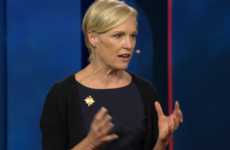
Need Inspiration?
Get inspired by 4,000+ keynote speaker videos & our founder, a top keynote speaker on innovation.
Soraya Chemaly's Talk on Women's Anger Advocates for Its Expression
Kalin Ned — January 29, 2019 — Keynote Trends
Activist and writer Soraya Chemaly is largely concerned with gender dynamics and social justice and her talk on women's anger reflects that. During her keynote, she takes a detailed look in the dynamics of the emotion and its gendered expression.
Chemaly begins to detail the way she was thaught to understand anger in the context of the female psyche -- "an exaggeration [and] a misrepresentation," that "will make [her] rude and unlikeable." For boys and men, however, the feeling is "reserved as [a] moral property." Offering a few viable examples to the audience, the speaker makes the case that "whether we're at home or in school or at work or in a political arena, anger confirms masculinity, and it confounds femininity." This is incredibly alarming as the emotion in question is the best mechanism to countering instances of social injustices and making it culturally inaccessible to women entails an increased vulnerability to harm, indignity, and insult.
Thus, the talk on women's anger addresses a narrative that is artificially constructed to silence the emotion in females and celebrate it in males. This belief is consistently reproduced by women who have been taught since they were little girls to not give way to their rage. Another developing problem is the consistent female self-objectification that leads further cultural misunderstandings that anger is a symptom of illness.
However, Soraya Chemaly finishes off her talk on women's anger with the belief that we have the power to do something about this gender imbalance through the societal discomfort that is generated by the emotion. We can observe and "think in terms of competence and not gender." The rage Chemaly speaks of here is that of hope and it is an emotion that more and more women and marginalized communities begin to excersise in the larger narrative to promote understanding and justice.
Chemaly begins to detail the way she was thaught to understand anger in the context of the female psyche -- "an exaggeration [and] a misrepresentation," that "will make [her] rude and unlikeable." For boys and men, however, the feeling is "reserved as [a] moral property." Offering a few viable examples to the audience, the speaker makes the case that "whether we're at home or in school or at work or in a political arena, anger confirms masculinity, and it confounds femininity." This is incredibly alarming as the emotion in question is the best mechanism to countering instances of social injustices and making it culturally inaccessible to women entails an increased vulnerability to harm, indignity, and insult.
Thus, the talk on women's anger addresses a narrative that is artificially constructed to silence the emotion in females and celebrate it in males. This belief is consistently reproduced by women who have been taught since they were little girls to not give way to their rage. Another developing problem is the consistent female self-objectification that leads further cultural misunderstandings that anger is a symptom of illness.
However, Soraya Chemaly finishes off her talk on women's anger with the belief that we have the power to do something about this gender imbalance through the societal discomfort that is generated by the emotion. We can observe and "think in terms of competence and not gender." The rage Chemaly speaks of here is that of hope and it is an emotion that more and more women and marginalized communities begin to excersise in the larger narrative to promote understanding and justice.
4.2
Score
Popularity
Activity
Freshness
























